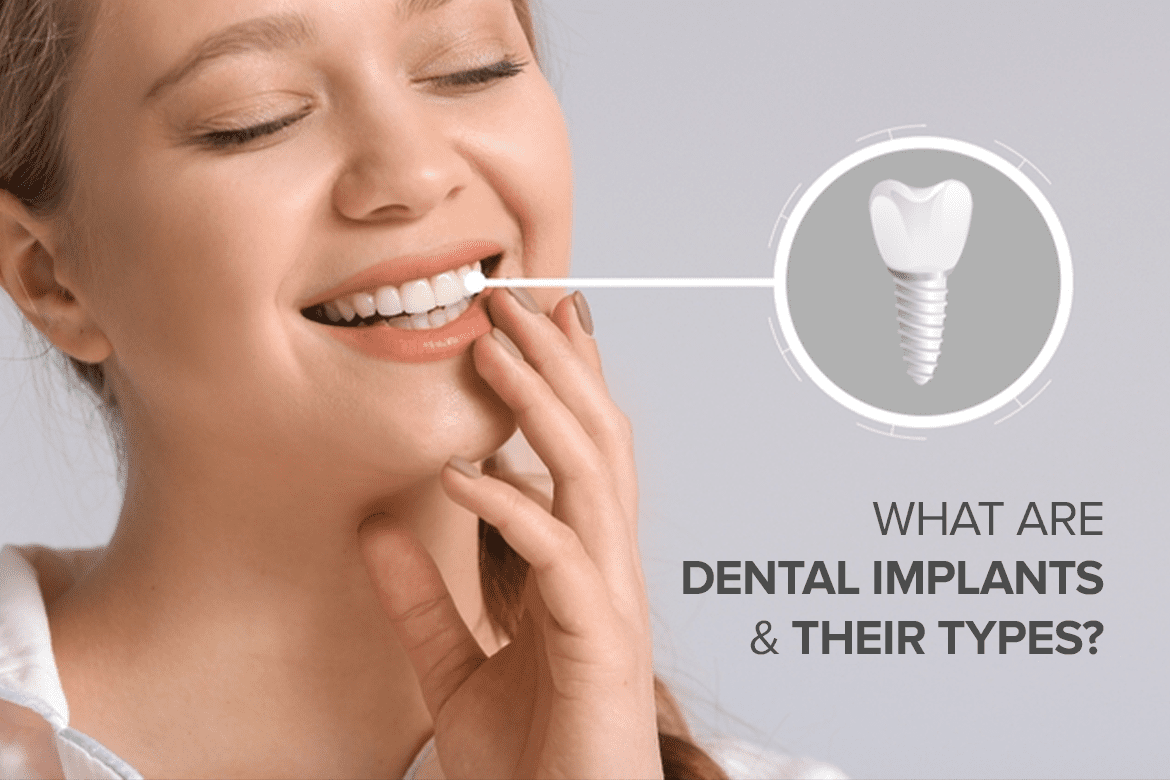



What are Dental implants?
Dental Implants replaces the lost teeth. Dental implants are commonly used to replace missing teeth and can provide a stable and long-lasting solution for patients with missing or damaged teeth.
The procedure involves a surgical placement of the implant into the jawbone, followed by a healing period during which the implant fuses with the bone. Once the implant has fully integrated, a prosthetic tooth or teeth can be attached to the implant, restoring the patient’s smile and improving their ability to eat and speak.
What are the Types of Dental implants?
There are 3 Types of Dental Implants:
- Endosteal
- Subperiosteal
- Zygomatic
Endosteal – These are the most common type of dental implants and are placed directly into the jawbone.
Subperiosteal – These are placed on top of the jawbone and under the gum tissue. Subperiosteal implants are typically used for patients who do not have enough bone height to support traditional implants.
Zygomatic – One of a pair of bones on each upper side of the face that forms the cheek and part of the eye socket.
Structure of the Dental implant System:
- Implant fixture
- Abutment
- Prosthetic teeth
Abutment – An abutment is a component of a dental implant system that serves as a connector between the implant fixture and the prosthetic tooth or teeth. It is typically made of titanium or zirconia and is designed to fit onto the top of the implant fixture, protruding above the gumline.
Prosthetic tooth or Teeth – It’s the process of replacing the missing tooth and covering up defect tooth.
Dental Implant Procedure:
Dental implant surgery is a commonly performed procedure that aims to replace missing or damaged teeth with artificial teeth that resemble and function like natural teeth. The type of implant used, and the condition of the jawbone determine how the surgery is carried out.
The process may involve multiple steps and can take several months due to the need for the bone to heal firmly around the implant. Before undergoing the procedure, a comprehensive oral and radiographic examination is conducted to determine your suitability for it.
When to consider Dental implant treatment:
- When one or more natural teeth are missing, and the patient desires a stable, long-term solution for tooth replacement.
- Have healthy oral tissues
What is the Dental Implant Procedure?
- Removal of Damaged Tooth
- Implant placement
- Healing process
- Abutment placement
- Artificial tooth placement
Implant placement – Once the site is prepared, the dental professional will place the implant into the jawbone. This implant is made of biocompatible materials like titanium that fuse with the bone over time through a process called osseointegration.
Healing process – After the implant is placed, the patient needs to wait for several months for the implant to fuse with the bone. During this time, the patient may wear a temporary tooth replacement to maintain function and aesthetics.
Abutment placement – After the implant fuses with the jawbone, a small metal connector called an abutment is placed onto the implant to connect the implant with the artificial tooth.
Artificial tooth placement – The final step is to attach the artificial tooth or teeth to the abutment.
New Teeth Implants Cost:
The price of implants varies from Place to Place and hospital to hospital. The average single-tooth implant cost is around INR 25,000 to INR 50,000 INR and more depending on the package.
Frequently Asked Question:
- Are Dental Implants Painful? The placement of dental implants is typically done under local anesthesia, so the procedure itself should not be painful. However, it is common to experience some discomfort and soreness in the days following the surgery, as the body heals and adjusts to the new implant.
- What Is the Cost of Dental Implants? Cost Varies from place to place and the package you choose. The average single-tooth implant cost is around INR 25,000 to INR 50,000 and more depending on the package.
- How to maintain dental Implants? It is very easy to care for natural teeth on daily basis. You have to keep it clean and plaque free twice a day using a brush and floss.
- What are the advantages of dental implants? This will make you feel completely normal. You can chew food easily.
- What are the disadvantages of dental Implants? It takes a long time to heal. Sometimes you might get an infection at your implant site.

